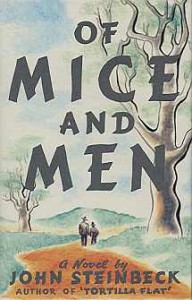Taking On the Challenge
In this culture where youth, health, beauty, and fitness are rated up there almost to the level of worship, sometimes a plot will call for a misfit.  An outcast. An oddball, if you will. The aberrant character.
An outcast. An oddball, if you will. The aberrant character.
One needn’t search far to find examples throughout literature of authors handling this challenge. We think of Benjy in William Faulkner’s The Sound and the Fury, and Lenny in Steinbeck’s Of Mice and Men. Who could forget the crippled dwarf in Poe’s Hopfrog? The play by Bernard Pomerance of The Elephant Man would be another in our list. I’m sure others come to your mind.
Going in such a direction with a story line can be a challenge – but an exciting challenge. If that’s the route you’re taking, here are a few things to keep in mind.
Natural Resistance
Readers enjoy living vicariously through story characters. They like to believe they could be as smart, cleaver, brave, and good looking as those in the novel they’re reading. The novelist who creates the not-so-pretty, not-so-appealing character, in effect, produces a natural reader resistance. For who wants to be the outcast in the world? Not many.
This means the author is dealing with human emotions on the most elemental level; it calls for the highest form of craft and art.
The writer must know why this choice is necessary for this particular plot. It cannot be for a shock effect alone, for then it is not art but a gimmick. Be certain that you have a valid reason for taking this route. That reason must be strong enough to support and sustain an entire novel.
Genuinely Care
The writer must genuinely care about their aberrant character. This is not to say it will be a sappy, feel-sorry-for-you caring, but rather there but for the grace of God go I approach. This comes mainly by recognizing and accepting our own personal limitations. Heaven knows, none of us are perfect. We all have shortcomings and weaknesses.
By applying this realization to this character you’ll be able to garner the reader’s sympathy and understanding. When from the pages it’s obvious that you as the author care about this individual, it will naturally resonate with the reader. (Now that’s a home run!)
 Research
Research
The root problem with which the outcast character suffers may be physical; or it may be mental or emotional. In any case, it will almost assuredly call for a fair amount of research. Beware of sloughing off in this area. Invest the time needed to get the facts straight. Interview professionals if necessary to get the full picture.
Additionally, read a few novels (plays and short stories) that successfully showcase an outcast character. Create a list of questions to ask yourself as you read, such as:
- How do I feel toward this character? Repulsed? Sympathetic? Cold? Concerned?
- Was the character alive and realistic?
- How was description and dialogue handled?
- Were action scenes in keeping with the limitations (or lack thereof) of this aberrant character?
You get the idea. You can add more even more, I’m sure.
Physical Description
No need to go overboard with the character’s physical description – especially if this is a physical deformity. Use a light touch, and let dialogue and action paint the picture and flesh out the character. It will be the dialogue and action that allow the reader to see beneath the surface, and into the core of this character.
Good Fiction
Good fiction reaches deep inside of us and changes us. It leads us inward to our secret truths, and not outward away from them. Good fiction demands that we take ourselves seriously and ask painful questions.
demands that we take ourselves seriously and ask painful questions.
The aberrant/outcast character can, if but for a few moments, astound the reader into a deeper vision and allows that reader to awaken to himself.
A clear representation of the outcast character can hit this target in a way that the most beautiful and charming character could never do. 
Coming Soon
The first two titles in the Norma Jean Lutz Classic Collection will be available in print form.
Flower in the Hills and Tiger Beetle at Kendallwood will soon be in bound copies.
Watch for upcoming announcements.


![]()

